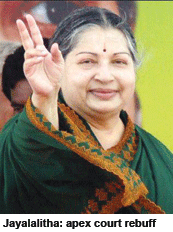 Persistent attempts by the dominant regional parties in Tamil Nadu (pop. 72 million) to make all school children statewide study Tamil, including students of 6,500 private matriculation schools (unique to Tamil Nadu), 565 schools affiliated with the Delhi-based Central Board of Secondary Education (CBSE) and 468 Council for the Indian School Certificate Examinations (CISCE), have been — and continue to be — challenged in the Madras high court by private schools.
Persistent attempts by the dominant regional parties in Tamil Nadu (pop. 72 million) to make all school children statewide study Tamil, including students of 6,500 private matriculation schools (unique to Tamil Nadu), 565 schools affiliated with the Delhi-based Central Board of Secondary Education (CBSE) and 468 Council for the Indian School Certificate Examinations (CISCE), have been — and continue to be — challenged in the Madras high court by private schools.
In June 2006, the DMK government (which was in power from 2006-2011) introduced the Tamil Nadu Tamil Learning Act (TNTLA) under which all 53,000 government schools and 6,500 private matriculation schools in the state were directed to make Tamil mandatory from class I, and gradually make the language compulsory for all children in classes I-X by 2015-16.
However, little was done to enforce it. Subsequently in February 2014, its successor AIADMK government sent letters to all private matriculation schools making Tamil a compulsory language paper in the class X board exam for the academic year beginning July 2015. This peremptory diktat prompted several associations of private matriculation schools and minority institutions to challenge the constitutional validity of TNTLA in the Madras high court late last year.
On November 23, the first bench of Chief Justice S.K. Kaul and Justice Pushpa Sathyanarayanan directed the state government to adopt “a liberal approach” as the rules of TNTLA 2006 were framed as late as in 2012. The bench granted two weeks for students who are yet to send their applications to opt out of learning Tamil and six weeks for the state government to evaluate the applications. Private matriculation schools including minority institutions (which under Article 30 (1) of the Constitution are entitled to “establish and administer educational institutions of their choice”) were granted a year’s exemption from implementing the provisions of the Act.
However, this temporary reprieve hasn’t satisfied the Telugu minority community of Tamil Nadu which held a massive rally on November 1 in Chennai under the banner of the Tamil Nadu Telugu Yuvasakthi (TNTY), protesting the state government’s violation of their fundamental right under Article 30 (1). “The state government wants students in English-medium Telugu minority schools to learn Tamil as the compulsory second language, and learn Telugu as an optional language for which marks will not be awarded,” says K. Jagadishwara Reddy, president of TNTY.
The crux of the problem is that unlike other states of the Indian Union which follow the three-language learning policy recommended by the Kothari Commission in 1966 and endorsed by the Central government, Tamil Nadu has a two-language policy (Tamil and English). The two-language policy was introduced in 1967 by then chief minister C.N. Annadurai of the sub-nationalist Dravida Munnetra Kazhagam (DMK), which violently protested a Central government directive to declare Hindi as the national language in the mid-1960s. However, until now, the two-language policy was applicable only to government schools in the state.
Private schools offered students the choice of Tamil or Hindi up to middle school and Tamil, Hindi, French or other languages in high school as elective second languages. Although private schools are not opposed to students learning Tamil, the imposition of Tamil as a compulsory language is being interpreted as unwarranted interference with the academic autonomy of private independent schools.
According to informed educationists and experts in Chennai, hitherto dormant linguistic ardour in Tamil Nadu has been re-ignited by propagation of Hindi and Sanskrit by Hindi language chauvinists of the educationally backward BIMARU (Bihar, Madhya Pradesh, Rajasthan, and Uttar Pradesh) states after the BJP-led NDA government was formed in Delhi in May 2014.
This has provoked the Jayalalithaa-led AIADMK government in Chennai to make Tamil a compulsory second language for all 565 CBSE and 468 CISCE-affiliated schools in the state.
“Many parents in transferable jobs are north Indians and prefer to admit children in CBSE schools as they offer a choice of learning Hindi and other languages. It’s very difficult for these students to learn Tamil and it should not be forced upon them.
Since CBSE schools follow the three language policy, Tamil should be introduced as a third language for students who have chosen other second languages,” suggests Geetha Jayachandran, principal, Yuvabharathi Public School, Coimbatore.
Quite clearly, the Jayalalithaa-led government’s resurrection of Tamil Nadu’s language chauvinism is political rather than educational. It’s high time quiescent academics of Tamil Nadu advised politicians — who take pride in the state’s progressive education system — that in an increasingly borderless world, school and college students move beyond native boundaries for education and jobs, and need to be free to learn languages of their choice.
Hemalatha Raghupathi (Chennai)

















